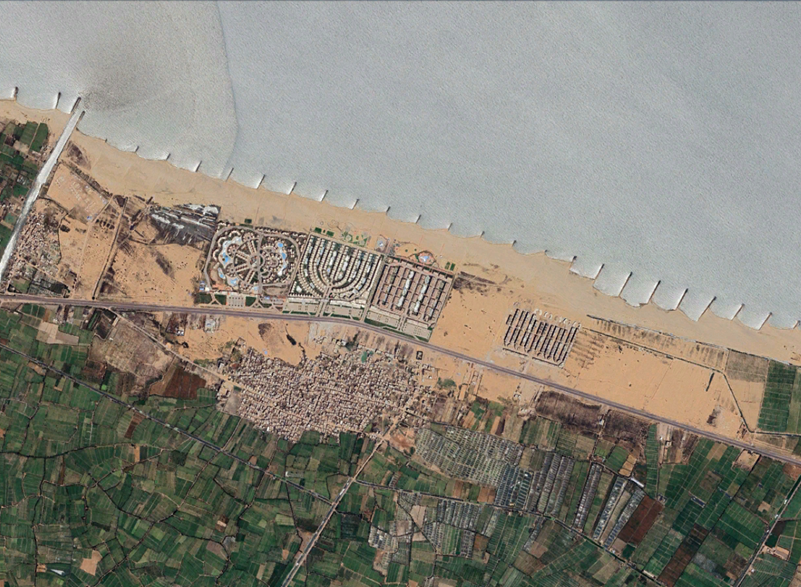Consulting Services for Conducting a Feasibility Study for the envisaged Nile Delta Shoreline Stabilization (East of Kitchener Drain) Project
Description
The Nile Delta in Egypt is one of the most vulnerable deltas to climate change worldwide. It accounts for large parts of Egypt’s economic activity and source of employment. Therefore, any loss of prime agricultural land due to coastal erosion and flooding will have a direct adverse impact on the livelihoods of millions of people, leading to hardship throughout the entire Egyptian economy.
The main causes/factors for shoreline erosion alongside the Nile Delta are:
- the decline in the supply of fluvial sediments to the coast (as a consequence of dam construction of dams upstream of the Nile River), and
- the rise of the sea level (currently still a minor factor).
The German Government has made funds available via KfW for the procurement of consultancy services to support the Egyptian Shore Protection Authority as the Project Executing Agency in the preparation of a Feasibility Study to combat the loss of prime agricultural land due to coastal erosion and flooding.
The study serves as preparation for an envisaged investment project. The area of the envisaged Project is a 15 km coastal section east of the Kitchener Drain on the eastern flank of the Nile in the Al-Burullus district of Kafr El-Sheikh Governorate. The target group of the envisaged Project is the population in the communities living in Kafr El-Sheikh governorate close to the Project area.
The following measures are intended for the envisaged Project:
- Investment Measures: Sustainable measures for stabilizing the shoreline at hotspots east of the Kitchener Drain aim to reduce shoreline erosion and flooding risks while minimizing shoreline maintenance needs, preserving existing infrastructure, and enabling economic and social development in the Project area. Initial attempts to combat erosion by groynes caused in some places a landward retreat of the shoreline. The envisage Project aims to compensate for this sand loss through nature-based methods such as sand nourishment with sand extracted from the seafloor where deposits of Nile sand accumulated in the past.
- Accompanying Measures: Besides stabilizing the coast east of Kitchener Drain, the envisaged Project also contributes to familiarizing and strengthening the Egyptian coastal authorities with sand nourishment as a means of nature-based coastal protection, leading to more independent future Project implementation.
The specific objective of this assignment is to prepare a sound and comprehensive Feasibility Study for the envisaged Project, which provides all necessary managerial, technical and financial economic information with a specific focus on environmental and social risks, including their mitigation for informed decision making. Hydrogen, biogas, and less carbon-intensive fuels, resource reuse and resource efficiency. The Assignment is a pioneering project in nature-based solutions in Egypt.
Services
Stage 0: Inception
- Fulfilling the role of the deputy team lead (Project Management);
- Organization and participation of and in Kick-off meeting;
- Desk study: Exploration of field site characteristics (social and environmental)
- Identification of major stakeholder organizations (incl. communities);
- Cooperations with coastal protection organizations Egypt;
- Analysis of institutional and legal aspects;
- Alignment with coastal zone management strategy and planned interventions;
- Identification of national legal framework and relation to international standards;
- Reporting on the above;
- Organization of the Inception workshop;
Stage 1: Baseline Analysis & Modelling
- Organization of the Baseline and analysis workshop.
- GIS
Stage 2: Feasibility via Surveying & Scoping
- Field Surveys (Offshore)
- E&S Scoping (Detailed scoping report, Detailed ESIA work plan, ToRs)
- Scoring of alternatives from social and environmental perspective
- Organization of the Surveying & Scoping workshop.
Stage 3: Project Preparation
- Preparation of project realization (IM): Description of project implementation procedures, including governance structure and risk control plan (risks related to ESIA, implantation procedures and governance)
- Preparation of Project assistance (AM):
- Analysis of organizational, institutional and financial aspects of coastal protection in Egypt
- Reporting on the above; Analysis of strengths, weaknesses and risks, in consultation with the PEA, MWRI and other involved parties and in consultation with the manager and developers of the ICZM plan
- Analysis of the PEA’s technical and management skills and the need for technical assistance in the realization of the Project and to define a clear outline for a future AM project
- Transfer to the PEA of knowhow, collected data, documents and analysis tools developed for the Assignment.
- Reporting on the above;
- Organization of the Project Preparation workshop.


